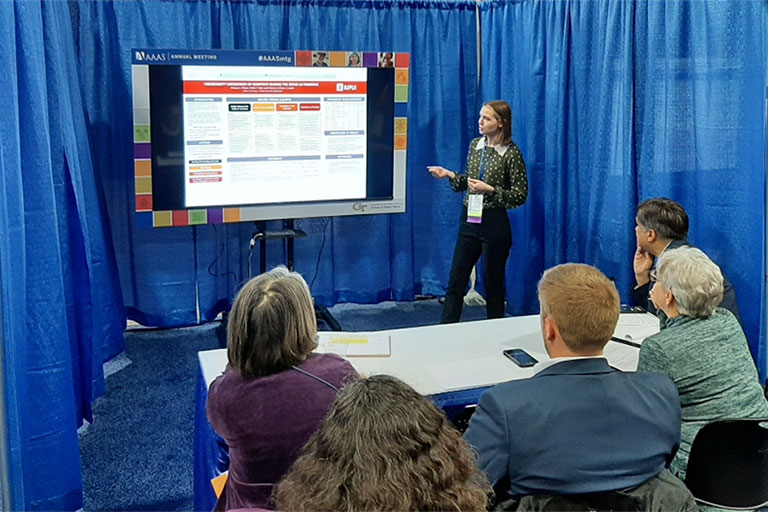A team of Indiana University doctoral students advanced into the final round of the American Association for the Advancement of Science e-poster competition, held March 2-5 in Washington, D.C.
Their poster – "Uncertainty Experiences of Scientists During the COVID-19 Pandemic" – explored how scientists and providers discussions of scientific uncertainty changes during the pandemic. Rebecca Wisner, Deidre Hall, Jacob Watson and Krista Longtin, Associate Professor of Communication Studies at Indiana University Purdue University Indianapolis, were co-authors.
"Over the last several years of the pandemic, the word 'uncertain' came up repeatedly," said Wisner, a doctoral student in the IU School of Medicine. "I had spoken to a colleague pursuing the uncertainty of medical students and I wanted to see it from a communication perspective concerning those actually talking to the public during the COVID-19 pandemic."
The research data were collected by Wisner and Hall, a doctoral student at the IUPUI School of Science, over the summer of 2022. They surveyed clinical and research scientists, science communicators, and media-active students with half of their participants being university faculty members or science industry representatives and half higher-education students.
Participants were contacted directly on social media platforms, such as Twitter, because the team wanted to ensure subjects were from the areas they were targeting. They asked questions about their background, how they became involved in science communication, how uncertainty affects the communication of their science and how the pandemic changed their method of communication.
"Science is not one static thing; it is an always changing field," Hall said. "For example, during the pandemic scientists' recommendations on vaccines and mask regulation was fluid and always changing as more information was being discovered. Our poster focuses on how uncertainty like that is communicated and absorbed."
Watson, a doctoral student at the IUPUI School of Liberal Arts, played a key role in the analysis and development of the poster after the data was collected.
The researchers collaborated on the script for the presentation, with Hall designing the final poster and Wisner recording the presentation for the video submission. Out of hundreds of e-poster submissions, their poster was selected to be one of three finalists nationally. Wisner presented the findings in-person on March 3.
"Becca, Deidre, and Jake were outstanding co-authors because they focused on and amplified one another’s strengths throughout the research and writing process," Longtin said. "Becca's degree is in anatomy education, Jake's is in communication studies and Deidre’s is in psychology. Each of them brought different perspectives to how we analyzed our data and wrote our conclusions. Those differences, I think, were one of the primary reasons for the team's success."
The American Association for the Advancement of Science annual e-poster competition provides an opportunity for higher education students to present their research. Finalists receive a chance for their research to be published in Science, one of the world's top academic journals, a $500 award and recognition certificate. Students' posters can fall under one of 10 science categories, including Science in Society, the IU finalists' research area.


